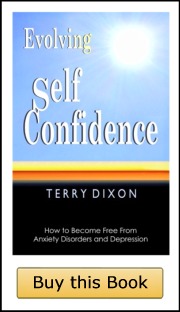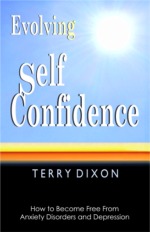|
.
|
Evolving Self Confidence:
How to Become Free From Anxiety Disorders and Depression
Reviews* 2
 Easy to read and understand and has helped immensely
Easy to read and understand and has helped immensely
Micki F.
 If you want to know exactly WHY you ended up as an anxiety ridden adult, read this book! Very insightful as to why we developed this
disorder. Easy to read and understand and has helped immensely.
If you want to know exactly WHY you ended up as an anxiety ridden adult, read this book! Very insightful as to why we developed this
disorder. Easy to read and understand and has helped immensely.

 Good read!
Good read!
Karl Pereraon
 Depression and self confidence are so connected that it was time a book like this was written. I enjoyed it and really recommend this
one. If you suffer from anxiety, depression or other phobias then this book is one you should read.
Depression and self confidence are so connected that it was time a book like this was written. I enjoyed it and really recommend this
one. If you suffer from anxiety, depression or other phobias then this book is one you should read.

 Gaining Self Confidence
Gaining Self Confidence
tonyzon
 I purchased this book on behalf of my wife ... and this is her review...
I've never done a book review before and am doing this one because I feel so passionately about helping others overcome this debilitating,
life threatening condition. It's a pity that much of the content would go over the head of family members and non suffers because very
often they hinder recovery by how they react and it would help them to be more tolerant and understanding.
I purchased this book on behalf of my wife ... and this is her review...
I've never done a book review before and am doing this one because I feel so passionately about helping others overcome this debilitating,
life threatening condition. It's a pity that much of the content would go over the head of family members and non suffers because very
often they hinder recovery by how they react and it would help them to be more tolerant and understanding.
This book has a totally different approach than anything I've read about anxiety and depression. It made me feel very `normal' by
confirming that I was always `normal' given my set of life experiences. It took the feeling of `madness' and `badness' and `illness' away,
by explaining how my responses had been beyond my control... but could be within my control.
I believe that the book won't suit everyone but if it helps another person as much as it has helped me, then it has all been worthwhile. If
for instance you are a person who believes that you have had the perfect life up to now, then this book is not for you.
Despite some of the negative comments in other reviews, I would like to thank Terry Dixon from the bottom of my heart. I agree that the book
is quite repetitive, but I personally welcomed it on first reading as it helped the points to sink in and hit home.
It has helped me on three counts; firstly by confirming things that I already believed but had been discouraged from thinking by my peers;
secondly, and most importantly for me, by dispelling the myth that a chemical imbalance in my brain was the cause of my depression, and
thirdly by giving me courage to act on my gut feeling and continue in my quest to come off anti-depressants. I have now been anti-depressant
free for almost two years and have never felt the need to go back.
It was as though Terry Dixon was talking about me when he described the feeling of `bad' which drives depression. I was feeling `bad' about
the underlying problem and `bad' because I couldn't do what family members expected of me, which was to `stop thinking' and be able to
control the unhappiness which was making them unhappy too, and creating `ill feeling' everywhere I turned. I felt wrong and `bad' in wanting to
talk and was silenced at every turn, but the worst `bad' feeling was the realization that I'd turned into this weak individual who couldn't help
herself, despite being told by those close to me that I should be able to.
Terry Dixon explains that it's quite normal to be bombarded with overwhelming thoughts ... and his view is that `Thinking too much' is
usually an attempt to understand and master the problem. He reassures that it's quite normal that thoughts just won't go away and that it's
normal to look to the past for answers. He makes it acceptable to look for answers and explains that we are not trying to apportion blame;
blaming makes us feel `bad' which makes the depression worse. We have a need to look at the negative events which we know have upset and
affected us, and then try to alter our responses to them, enabling us to break the pattern.
It was incredibly reassuring to have it explained that negative experiences cause us to react in a certain way, and that if we suffer the
same, or similar trauma, throughout our lives our brain becomes conditioned to respond in the same manner. It was wonderful for me to read
that increased anxiety in many people is not down to illness or disorder,but down to life experience and the way our brains compute
traumatic events. It's all to do with patterns of neurons the brain forms and the connections between them, which all sounds very complicated
but he explains it very well and it soon makes sense. It was reassuring to read that anxiety is quite normal too and is related to coping; he
describes it as a `protector' and a`preparer' rather than a sign of weakness, as others would have us believe.
One of the most fundamental things which he touched on was religion. I had been driven by my sense of what was right and wrong, according to
my Catholic upbringing which played a huge role in my depression. I am an intelligent woman, but never in my 55 years had I ever considered
that the rules on how to behave have been set out by another human being, and not by God; that on its own changed my thinking.
Terry Dixon gave me permission to acknowledge that events took place, to accept my thoughts and feelings, without having to change my
beliefs or to ignore my feelings or deny them, but instead be aware that I am able to change how I respond to the triggers in future.
Past attempts at cognitive behaviour therapy served only to make to me feel more inadequate, by implying that my view of the world was
wrong, and that I was thinking abnormally; but this is about accepting, not changing, and trying to break the cycle of anxiety that certain
circumstances provoke in the brain.
Most of the book is taken up by the explanation, but then goes on to suggest ways of breaking the cycle, together with advice on diet and
relaxation. A life saver for me...

 Evolving Self Confidence: How to Become Free from Anxiety Disorders and Depression.
Evolving Self Confidence: How to Become Free from Anxiety Disorders and Depression.
Brucie
 Excellent book. Thoroughly enjoyed reading it and have learnt such a lot. If you suffer with any form of anxiety disorder, you will soon
realise that you are definately not alone and that there are simple ways to combat anxiety and learn to manage your feelings. Well worth
reading.
Excellent book. Thoroughly enjoyed reading it and have learnt such a lot. If you suffer with any form of anxiety disorder, you will soon
realise that you are definately not alone and that there are simple ways to combat anxiety and learn to manage your feelings. Well worth
reading.

 Regaining my self confidence!
Regaining my self confidence!
joysee
 Interesting, easy read and very simple to associate with. Recommend reading it if you like me suffer from low confidence and
panic attacks.
Interesting, easy read and very simple to associate with. Recommend reading it if you like me suffer from low confidence and
panic attacks.

 Thoroughly recommended
Thoroughly recommended
Gaz
 This was a gift that was gratefully accepted. I was astounded by how much sense it made and also gave me massive comfort when I needed it
most. I don't think anxiety and depression ever leave you but I do believe it can be managed. This book is easy to read simple but very
effective. I felt a lot better after reading it and realised that I'm not alone with anxiety which helped.
This was a gift that was gratefully accepted. I was astounded by how much sense it made and also gave me massive comfort when I needed it
most. I don't think anxiety and depression ever leave you but I do believe it can be managed. This book is easy to read simple but very
effective. I felt a lot better after reading it and realised that I'm not alone with anxiety which helped.
I've read it three times now and go back and read when I start to struggle again. Cant recommend highly enough.

 A very important book
A very important book
Sarasa
 'Evolving Self Confidence' is a very important book. From my perspective, it combines elements from current psychotherapies including (but
by no means limited to) schema therapy and cognitive behavioural therapy. What emerges is a coherent picture of how anxiety disorders
(including depression) may develop in some individuals. Having acquired an understanding of how this process unfolds, a person is in a
better position to know how to reverse this process; the book expands on this theme.
'Evolving Self Confidence' is a very important book. From my perspective, it combines elements from current psychotherapies including (but
by no means limited to) schema therapy and cognitive behavioural therapy. What emerges is a coherent picture of how anxiety disorders
(including depression) may develop in some individuals. Having acquired an understanding of how this process unfolds, a person is in a
better position to know how to reverse this process; the book expands on this theme.
'Evolving Self Confidence' should appeal to professionals and laypersons alike (I'm one of the latter). I found the book compelling
reading. If you want to gain valuable insight into this subject material, this is an excellent starting point. Indeed, it may well be the
only book you need.
Should there be further editions of this book, I would like to see some information included about the author. A foreword by an eminent
person in the field of anxiety/depression research would also be a very worthwhile addition. In the meantime, full marks go to Terry Dixon
for 'Evolving Self Confidence'.

1
- 2
- 3
- 4
- 5

Read the first chapter free

|
.
|

*Review source: Amazon UK and US
|